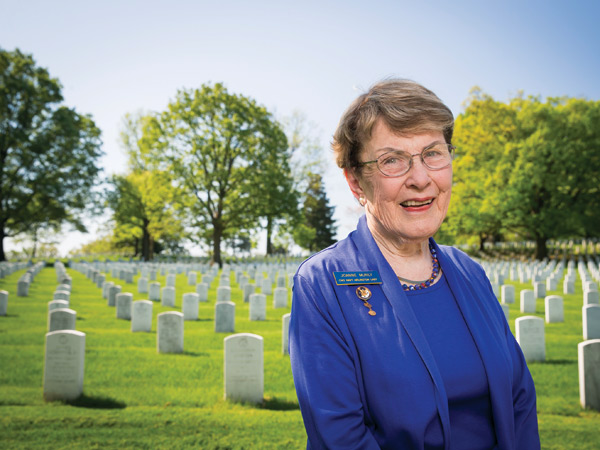JOANNE MUNLY stands in the mist of Arlington National Cemetery, her elbow linked around the arm of a sailor from the U.S. Navy Ceremonial Guard. Under a long black coat and elegant scarf, her slight silhouette interrupts a sea of white headstones in Section 11. A green awning and two rows of fabric-covered folding chairs mark an open and empty grave.
As the funeral procession arrives, mourners encircle the gravesite, huddling under umbrellas for the full military honors ceremony, which includes members of the U.S. Navy Band, a U.S. Army horse-drawn caisson team, a colors team and casket team.
After a breathtaking three-rifle volley salute and a mournful rendition of “Taps” by the bugler, the American flag is folded and presented to the widow. Munly steps forward to take her hand, offering warmth and condolences. Six weeks from now, she will write a letter to the widow, letting her know that she is not forgotten.

Volunteer Joanne Munly at Arlington National Cemetery. Photo by Erick Gibson.
Munly, 86, is a member of the Arlington Ladies, an all-volunteer force that ensures that no service member is buried alone. The idea emerged in 1948, soon after then Chief of Staff of the U.S. Air Force Gen. Hoyt Vandenberg and his wife, Gladys, witnessed a burial attended only by a chaplain and an honor guard. They believed military families deserved better.
Since then, Arlington Ladies have attended roughly 100,000 services for fallen members of the U.S. Army, Navy Air Force and Coast Guard at Arlington National Cemetery. (The U.S. Marine Corps sends a representative of the Marine commandant to every funeral.) Men are welcome to join the group—which is made up of former active-duty service members and their spouses or widows—though none serve on the current roster of 200 volunteers.
Like their military counterparts, the Arlington Ladies adhere to strict guidelines on the cemetery grounds. They don’t intrude and they don’t cry. “No tears,” says Munly, a Lyon Village resident whose own husband, a Navy commander, was laid to rest here in 2013.
Before she leaves the cemetery, Munly stops by the Arlington Ladies office in a nearby administration building and takes a moment to decompress with fellow volunteers, including Willo Conlon, 45, a former Army officer, the wife of an Army veteran and the mother of 3-year-old twins, who is heading out to attend another service.
Once the room is quiet, Munly’s thoughts return to the soldier who was just laid to rest. “He was a flier shot down over Vietnam,” she says. “He spent two years in isolation and five more years in prison. I wanted to thank [his wife] for her service, too. Because she was alone for a long time.”
